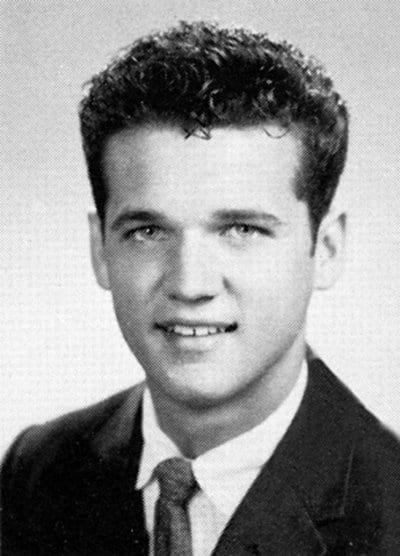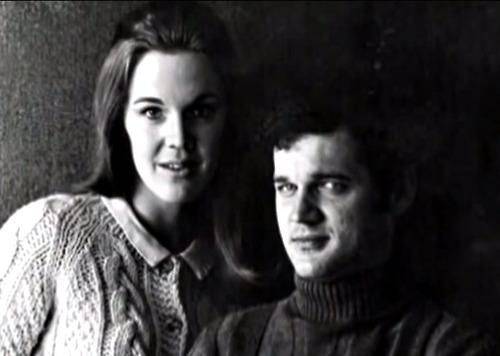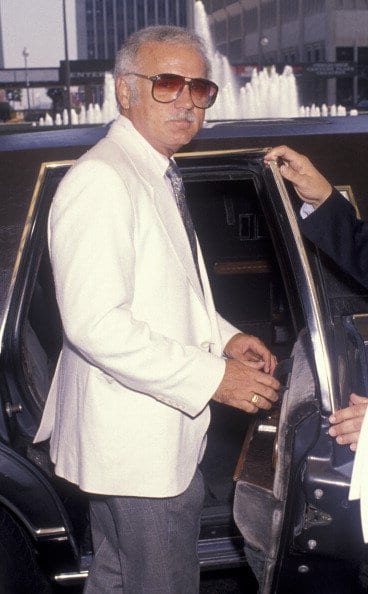There is a well-documented history of artists and creative types living tormented lives and being unable to assimilate into society as easily as others seem to. I, for one, am a huge fan of not only the paintings of Vincent van Gogh but also the story of his life and his trouble with practicing his art while forming healthy relationships. David Lynch obviously knew that Jack Nance lived such a life, dedicated to his art yet also hopelessly unable to find a place in the world. I Don’t Know Jack, the documentary presented by David Lynch delves into the life of Jack Nance, most notably the star of Eraserhead, though he can be found in several other Lynch features, as well. Lovingly remembered as Pete Martell from Twin Peaks, and given some of the best lines of the series, Jack Nance led an interesting life and those he knew were simply along for the ride. Though he never seemed to struggle to find work or friends, Jack Nance seemed to be unable to navigate his existence in a way that left him personally fulfilled. Prone to alcohol-fueled rages, Nance remained a treasure to his friends, especially David Lynch, who saw fit to highlight his life in I Don’t Know Jack, perhaps in hopes that fans of the films Nance left his indelible mark on could get to know him a little better. Delving into the life and mysterious death of Jack Nance, it is clear to see why he became a dear friend to David Lynch, his personality is perfectly Lynchian, and one I am personally grateful for becoming acquainted with through this documentary.
Opening with a brilliant story emphasizing the gift of Jack Nance for storytelling, it is revealed to the audience that even those closest to him could never be sure whether or not Jack was telling the truth when he told a tale, or if he was simply entertaining. Known to embellish the facts, or even outright make up a story, Jack Nance sounds like everyone’s favorite uncle at Christmas dinner. His family remained dear to Nance, all throughout his life. Even after he was asked to stay away from his own family, and the children of his closest friends during the time he was in the throes of alcoholism, Nance happily rejoined them once he had finally committed to treatment. The treatment Nance so desperately needed came from a most unexpected place. While working on the set of Blue Velvet (1986) Nance was taken by the focus and commitment he saw Dennis Hopper give to his acting. Hopper himself was newly clean and sober after completing drug and alcohol treatment, and Nance seemed to recognize this and reach out to him in a unique way. In I Don’t Know Jack, Dennis Hopper recalls an evening in his hotel room when Jack Nance claimed he would jump out of the window if Hopper didn’t help him. Committed to helping another artist out of the same hole he had fallen into, Hopper helped Jack a great deal by taking him to an alcohol rehabilitation center and reframing the lens through which Jack looked in order to help him battle his addictions.

A lifetime of struggling to meaningfully interact with those around him and the initial disappointment of not fitting into the Hollywood system left Jack looking for solace at the bottom of a bottle. Two lead roles just narrowly escaped the grasp of Jack Nance. If he had been able to secure the lead roles in either of the films he was so close to, In Cold Blood (1967) or The Graduate (1967) the star of 24-year-old Jack Nance would have been one that shined into eternity. One of Jack’s brothers recalls with forlorn just how much those roles meant to Nance and can’t help himself but to lament at what may have been had even one of those roles worked out in Nance’s favor. Each person throughout the documentary questioned about the work ethic of Nance praises his dedication and devotion to the craft of acting. Everyday life may have been a different story as Catherine E. Coulson, affectionately known to Twin Peaks fans as “The Log Lady”, who was also formerly married to Jack, tells the camera that she worked multiple jobs to keep the fledgling couple afloat while he filled his days hosting gambling parties and spending raucous evenings with friends. Coulson recounts the frustration of the exhaustion she experienced being with Jack, yet tells the story they shared together with soft affection making clear that the alcoholism brought about the end of their marriage rather than any carelessness toward the home on Nance’s part. Another Lynch favorite, Charlotte Stewart recounts the many odd jobs Nance took on in between acting engagements and how aloof he often was towards those jobs while his focus remained on working as an actor. Another common theme of the life of a creative, Jack Nance seemed wholly disinterested in the mundane aspects of everyday life and unable to commit to jobs that did not fulfill him because his preoccupations were so entrenched in artistic endeavors. Perhaps Jack’s favorite acting gig was an early one when he was part of an ensemble of actors known as the Do-Da Gang, actors who never broke character. It was this all-encompassing type of acting that Nance thrived on and may have been the time he was most fulfilled as an artist.
We have a Volkswagen and a roof rack to thank for the Jack Nance audiences know today. After unenthusiastically auditioning for a student film, simply hoping to find work as an actor and eat that week, Jack Nance was walked to his car by the student director of the film he had just auditioned for, David Lynch. When the pair walked in front of Lynch’s car, Jack stopped to marvel at the wooden roof rack atop the Volkswagen. When Jack exclaimed aloud how impressed he was with the roof rack, Lynch proudly thanked him, informing Jack that was his car and the two began to discuss cars and woodworking. It was through this conversation, rather than his audition, that Lynch saw a particular energy in Nance that he wanted to harness for his film. Nance eventually got the role of Henry Spencer, joining Charlotte Stewart, and would enlist his wife Catherine E. Coulson to help on the production. What began as a 20-minute short film evolved into a feature-length film that no one working on it knew if it would ever get finished. Each member of the cast and crew would work odd jobs during Eraserhead‘s production and the piecemeal filming brought them all together to create a family that would last for more than 30 years. Coincidence and organic growth, the exact aspects of life Lynch seems to embrace so much, led to his relationship with Nance creating a perfectly Lynchian story for a perfectly Lynchian personality.

After Jack’s alcoholism destroyed his marriage to Catherine Coulson, he was left to his own devices, with only brief periods of sobriety before Dennis Hopper would eventually help him toward recovery. Nance didn’t enjoy any meaningful relationship following the dissolve of his marriage until he would begin a relationship with a woman he met during his time in rehab, Kelly Van Dyke. The daughter of Jerry Van Dyke had struggled with drug and alcohol problems most of her adult life and was hopeful that through rehab she could beat her addiction and shed her past of working in adult films. Committed to his sobriety and convinced he could help her stay clean, the two troubled souls married in May of 1991, soon after Jack uttered the now famous line “she’s dead. Wrapped in plastic.” It was a happy time for Jack Nance, he was enjoying a career resurgence, devoted to sobriety, and welcomed into his family again, but tragedy would soon strike one night in November. While Jack was on set of a film he was working on, a torrential storm postponed filming. While on the phone with Kelly, who had relapsed, Jack confessed that he no longer knew how to help Kelly and that he loved her too much to continue their relationship and watch her destroy herself. Jack’s own sobriety was at risk, as well, with a relapse of his own being all the more likely being married to someone who refused help. A desperate Kelly told Jack that she would kill herself if he hung up on her seconds before the storm cut the phone line. A frantic Jack ran to the trailer of his director to see if his phone line would work. When that phone line was also dead, the two rode to a nearby police station in an attempt to reach Kelly. Jack received the worst news of his life when the Los Angeles police station went to his home and found Kelly to have committed suicide by hanging.
To everyone’s surprise, Jack remained sober through the aftermath of Kelly’s suicide until one morning he woke up unable to find a reason not to drink. Jack’s final months were tragic both for himself, and those around him. Even though he was often with friends, he was disconnected. Those closest to him took on the role of caretaker more often than not as Jack just didn’t have it in him anymore to take care of himself. While having lunch with a few of his friends on November 29th, 1996, Jack confessed to getting punched and knocked to the ground outside of a donut shop before dawn. His friends pressed him, not knowing if he was telling the truth or another tall tale, Jack claimed that he mouthed off to a couple men in their mid-20’s when one of them gave him a single punch to the face that flattened him to the ground. Nance claimed that he got what he deserved and wasn’t interested in tracking anyone down or pressing charges, and an inquiry into the incident by a friend who visited the donut shop later that day brought no information. Jack Nance was found dead in his apartment the morning after this incident is alleged to have taken place, his cause of death listed as the result of blunt force trauma, a homicide.

I Don’t Know Jack is a documentary that is not attempting to paint Jack Nance as a perfect person, but rather to expose his imperfections to illustrate a complete person. Many documentaries, especially those made after the subject has died, fail to give much insight as to who the subject was in favor of leaving out unflattering details. After watching I Don’t Know Jack, however, the audience can understand the faults of Jack Nance, but also his incredible humanism and his complete dedication to his art. Jack was a cynical, droll loner with a drawn-out manner of speaking that kept friends engaged and eager to hear his stories. Jack was passionate about his craft and was immensely satisfied anytime he was working. Jack put his heart into acting and was a great friend to those lucky enough to have him wander into their lives. One enters the documentary knowing little about the character actor who starred in five of David Lynch’s films, but after listening to his family and friends fondly recall his life, once the credits roll, one can no longer say “I Don’t Know Jack.”



I am in the UK and would love to see this documentary. Do you know where I can see it. It doesn’t appear to be on david Lynch,com anymore, and its $99 on Amazon which is a bit too much money for me! I would happily pay $10 dollars or something to pay for a download version. Any help would be much appreciated.
I am in the UK and would love to see this documentary. Do you know where I can see it. It doesn’t appear to be on david Lynch,com anymore, and its $99 on Amazon which is a bit too much money for me! I would happily pay $10 dollars or something to pay for a download version. Any help would be much appreciated.
I produced this film and you give an amazingly accurate overall view.
Thank you,
Richard Green
Next Step Studios
I love this documentary and rewatch the DVD at least once a year. The warmth, affection and respect that shines from everybody that talks about him makes me cry and lament his unfortunate death as if he was my own dear friend.